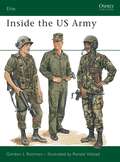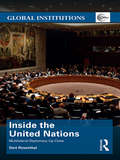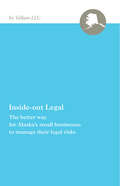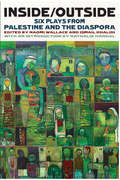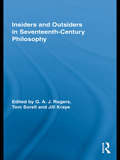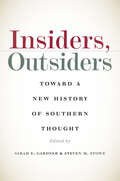- Table View
- List View
Inside the Star Wars Empire: A Memoir
by Bill KimberlinBill Kimberlin may refer to himself as &“one of those names on the endless list of credits at the close of blockbuster movies.&” In reality though, he&’s a true insider on some of the most celebrated and popular movies and franchises of the past century. Jurassic Park. Star Trek. Jumanji. Schindler&’s List. Saving Private Ryan. Even Forrest Gump. And perhaps most notably, Star Wars. Inside the Star Wars Empire is the very funny and insightful tell-all about the two decades Kimberlin spent as a department director at LucasFilm Industrial Light and Magic (ILM), the special effects studio founded by the legendary filmmaker George Lucas.
Inside the Stargazer's Palace: The Transformation of Science in 16th-Century Europe
by Violet MollerEnter the mysterious world of sixteenth-century science, where astronomers and alchemists shared laboratories.In 1543, Nicolaus Copernicus declared the earth revolved around the Sun, overturning centuries of scholastic presumption. A new age was coming into view – one guided by observation, technology and logic. But omens and elixirs did not disappear from the sixteenth-century laboratory. Charms and potions could still be found nestled between glistening brass instruments and leather-bound tomes. The line between the natural and supernatural remained porous, yet to be defined. From the icy Danish observatory of Tycho Brahe, to the smoky, sulphur-stained workshop of John Dee, Violet Moller tours the intellectual heart of early European science. Exploring its rich, multidisciplinary culture, Inside the Stargazer&’s Palace reveals a dazzling forgotten world, where all knowledge, no matter how arcane, could be pursued in good faith.
Inside the Stargazer's Palace: The Transformation of Science in 16th-Century Northern Europe
by Violet MollerEnter the mysterious world of sixteenth-century science, where astronomers and alchemists shared laboratories... 'There is magic in these pages.' Daisy Dunn, author of The Missing Thread In 1543, Nicolaus Copernicus declared the earth revolved around the Sun, overturning centuries of scholastic presumption. A new age was coming into view – one guided by observation, technology and logic. But omens and elixirs did not disappear from the sixteenth-century laboratory. Charms and potions could still be found nestled between glistening brass instruments and leather-bound tomes. The line between the natural and supernatural remained porous, yet to be defined. From the icy Danish observatory of Tycho Brahe, to the smoky, sulphur-stained workshop of John Dee, Violet Moller tours the intellectual heart of early European science. Exploring its rich, multidisciplinary culture, Inside the Stargazer&’s Palace reveals a dazzling forgotten world, where all knowledge, no matter how arcane, could be pursued in good faith. *** 'In this fascinating study of the early scientific revolution, when experimental thought was beginning to emerge from Medieval scholasticism, Violet Moller brings to life the trailblazers of this new age.' Paul Strathern, author of The Other Renaissance 'Inside the Stargazer's Palace plunges us into an irresistible network of touchy scientists, unpredictable patrons and religious controversy in the sixteenth century, antechamber of the modern world. Violet Moller is an assured and expert guide to this world, writing with a light touch and an infectious love of her subject.' Christopher de Bellaigue, author of The Lion House &‘Inside the Stargazer&’s Palace takes the reader to places they are unlikely to have visited and to figures they are unlikely to know… Violet Moller brings the world to life vividly and with style.&’ Nicholas Spencer, author Magisteria
Inside the Texas Chicken Ranch: The Definitive Account of the Best Little Whorehouse (Landmarks)
by Jayme Lynn BlaschkeThanks to the classic Dolly Parton film The Best Little Whorehouse in Texas and ZZ Top's ode "La Grange," many people think they know the story of the infamous Chicken Ranch. The reality is more complex, lying somewhere between heartbreaking and absurd. For more than a century, dirt farmers and big-cigar politicians alike rubbed shoulders at the Chicken Ranch, operated openly under the sheriff's watchful eye. Madam Edna Milton and her girls ran a tight, discreet ship that the God-fearing people of La Grange tolerated if not outright embraced. That is, until a secret conspiracy enlisted an opportunistic reporter to bring it all crashing down on primetime television. Drawn from exclusive interviews and expanded with newly uncovered information, Jayme Lynn Blaschke's revelatory exposition of the Ranch illuminates the truth and lies surrounding this iconic brothel.
Inside the Third Reich
by Clara Winston Richard Winston Albert SpeerSpeer, the Minister of Armaments and War Production under Hitler, the man who had kept Germany armed and the war machine running even after Hitler's mystique had faded, takes a brutally honest look at his role in the war effort.
Inside the Tudor Home: Daily Life in the Sixteenth Century
by Bethan WattsInside the Tudor Home sheds light on how people lived in the sixteenth century from plush royal palaces to wattle-and-daub cottages and everything in between. Power. Politics. Prosperity. Plague. Tudor England; a country replete with sprawling landscapes, dense forests and twisting urban labyrinths. This is a place of stagnation and of progress; of glorious cultural revolution, where the wheel of fortune is forever turning. From the plush royal palaces to the draughtiest of wattle-and-daub cottages, sixteenth-century England revolved around the people who formed the beating heart of Tudor society. These people celebrated scientific progress and lamented religious persecution; championed the rights of women and the underrepresented; fell in love with sweethearts, cared for pets and mourned the deaths of their loved ones. In her first book, Bethan Catherine Watts sheds light on the Tudor home and the everyday lives of those who lived there.
Inside the US Army
by Gordon Rottman Ronald VolstadWhen conscription was eliminated in the early 1970s, the US Army found itself with a very different kind of soldier. While the personality of the Army remained the same, the organization of its higher levels of command and combat formations, and the internal structure of its units underwent major changes under the 'Army of Excellence' program of the 1980s. This book explores the US Army of the late 80s, including the training methods, weapon systems, Reserve Components, organization and uniforms of one of the world's most potent fighting forces. The text is illustrated with numerous photographs and eight colour plates.
Inside the US Navy of 1812–1815 (Johns Hopkins Books on the War of 1812)
by William S. DudleyWhat did it take—logistically and operationally—for the small and underfunded US Navy to face the battle-hardened Royal Navy in the War of 1812? Find out in this book, the magnum opus of one of the deans of American naval history.When the War of 1812 broke out, the newly formed and cash-strapped United States faced Great Britain, the world's foremost sea power, with a navy that had largely fallen into disrepair and neglect. In this riveting book, William S. Dudley presents the most complete history of the inner workings of the US Navy Department during the conflict, which lasted until 1815. What did it take, he asks, for the US Navy to build, fit-out, man, provision, and send fighting ships to sea for extended periods of time during the War of 1812?When the British blockade of 1813–14 severely constrained American sea trade, reducing the government's income and closing down access to American seaports, the navy was forced to innovate: to make improvements through reforms, to redeploy personnel, and to strengthen its industrial capacity. Highlighting matters of supply, construction, recruitment, discipline, medical care, shipbuilding, and innovation, Dudley helps readers understand the navy's successes and failures in the war and beyond. He also presents the logistics of the war in relation to fleet actions on the lakes and selected ship actions on the oceans, stresses the importance of administration in warfighting, and shows how reforms and innovations in those areas led to a stronger, more efficient navy. Refuting the idea that the United States "won" the war, Dudley argues that the conflict was at best a stalemate. Drawing on twenty-five years of archival research around the world, Inside the US Navy of 1812–1815 will leave readers with a better appreciation of how the navy contributed strategic value to the nation's survival in the conflict and assisted in bringing the war to an honorable end. This book will appeal to scholars and students of naval and military history, veterans, current officers, and maritime-oriented history buffs.
Inside the United Nations: Multilateral Diplomacy Up Close (Global Institutions)
by Gert RosenthalInside the United Nations illustrates some of the parameters surrounding consensus-building at the United Nations, seeking to provide new insights beyond what is already known. The author spent twelve years as P.R of Guatemala at the UN, offering him privileged observatories in all three of the main inter-governmental organs: the General Assembly, the Economic and Social Council, and the Security Council. In this book Rosenthal focuses on six case studies that offer the breadth and scope of what the UN does, and illustrate some of the main elements of the dynamics of consensus-building, providing concrete examples of the ingredients that shape decision-making in a multilateral setting. The chapters: cover the origin, preparation, and outcome of two successful international conferences: the 2000 Millennium Summit and the 2002 International Conference on Financing for Development; look at the 2000 negotiation on the scale of assessments to finance the UN’s budget in the General Assembly’s fifth committee (2000-2001); focus on the relevance of the Economic and Social Council; consider the internal politics involved in vying for elected posts in intergovernmental bodies by focusing on the campaign to be elected to the Security Council between Guatemala and Venezuela in 2006; reflect on the peculiarities of decision-making in the Security Council. Providing an insider’s view on the UN and exploring different facets of multilateral diplomacy at the UN, this book will be of great use and interest to scholars of international relations as well as the diplomatic community.
Inside the VC and the NVA: The Real Story of North Vietnam's Armed Forces
by Michael Lee LanningIf the costs of the Vietnam War were great to Americans and staggering to the South Vietnamese, they were even worse for the North. And those costs were borne largely by the individual soldiers—the soldiers who won the war.<P> Based on interviews, soldiers’ diaries, letters, and government documents, this book, first published in 1992, gives a classic, soldier’s-eye account of the war our opponents fought and the men who fought it.
Inside the Vatican of Pius XII: The Memoir of an American Diplomat During World War II
by Harold H. Tittmann IIIAn invaluable contribution to the history of the Catholic Church during the Second World War, this is a richly detailed eyewitness account of the life and politics of the Vatican by an American who worked there from 1940 to 1944. The question of whether Pius XII and the Vatican must bear blame for failing to act decisively in response to Hitler's Final Solution is as hotly debated today as in the years directly following World War II. INSIDE THE VATICAN OF PIUS XII presents for the first time the obse...
Inside the Vatican: The Politics and Organization of the Catholic Church
by Thomas S.J. ReeseA comprehensive examination of the world’s most complex religious organization.There are one billion Catholics in the world today, spread over every continent, speaking almost every conceivable language, and all answering to a single authority. The Vatican is a unique international organization, both in terms of its extraordinary power and influence, and in terms of its endurance. Popes come and go, but the elaborate and complex bureaucracy called the Vatican lives on. For centuries, it has served and sometimes undermined popes; it has been praised and blamed for the actions of the pope and for the state of the church. Yet an objective examination of the workings of the Vatican has been unavailable until now.Drawing on more than a hundred interviews with Vatican officials, this book affords a firsthand look at the people, the politics, and the organization behind the institution. Thomas Reese brings remarkable clarity to the almost Byzantine bureaucracy of congregations, agencies, secretariats, tribunals, nunciature, and offices, showing how they serve the pope and, through him, the universal church. He gives a lively account of how popes are elected and bishops appointed, how dissident theologians are disciplined and civil authorities dealt with. Throughout, revealing and colorful anecdotes from church history and the present day bring the unique culture of the Vatican to life.The Vatican is a fascinating institution, a model of continuity and adaptation, which remains constant while functioning powerfully in a changing world. As never before, this book provides a clear, objective perspective on how the enormously complex institution surrounding the papacy operates on a day-to-day level, how it has adapted and endured for close to two thousand years, and how it is likely to face the challenges of the next millennium.Praise for Inside the Vatican“Reese does an admirable job of lifting the veil of secrecy surrounding the Holy See to examine the nuts and bolts of the operation . . . [He] paints a revealingly human portrait of Vatican life . . . Ultimately, this is the merit of Inside the Vatican: Reese gets it right. And in [such] a place . . . that’s no easy task.” —Greg Burke, Time“[Reese] paints a clear, largely dispassionate and often compelling picture of Vatican operations and, in so doing, highlights the tensions that tear the church.” —Diego Ribadeneira, The Boston Globe“[T]his is a useful and even valuable study of the institutional centre of the Roman Catholic Church, and of the relations between the centre, and the worldwide network of local churches which go to make up the Church catholic. Dr. Reese . . . brings impressive qualifications and experience as a political scientist to this [study] . . . It is the special virtue of Dr. Reese’s study that he succeeds where many have failed in providing an analytic, critical and comprehensive account of how [the Vatican] works.” —Seán Mac Réamoinn, The Irish Times
Inside the Welfare State: Foundations of Policy and Practice in Post-War Britain (British Politics and Society)
by Virginia NobleBy moving beyond consideration of the welfare legislation enacted in the 1940s, this book explains how government aid was actually provided in the new British welfare state created just after World War II. Revealing dimensions of social policy that have been neglected by scholars, this study uncovers the practices of the officials who decided how welfare would be distributed. Between 1945 and 1965, social policy was in a state of flux, as officials sought to reconcile the new welfare state’s message of unqualified inclusion with deeply ingrained norms that militated against providing state aid to working-age men, to women who had even a tenuous connection to a male wage-earner, or to black and Asian immigrants who lacked an authentic "British" identity. Fusing the rationales of the poor law and the technologies of the modern bureaucratic state, various government branches tried to shape the behavior and attitudes of those seeking benefits. These mechanisms of welfare distribution created a bureaucratic language and logic that foreshadowed the more publicized, politicized anxieties that would surface as the welfare state itself came under attack later in the 20th century.
Inside the Wire: A Military Intelligence Soldier's Eyewitness Account of Life at Guantanamo
by Erik Saar Viveca NovakDescribes in vivid detail the conditions and treatment.
Inside-out Legal: The better way for Alaska’s small businesses to manage their legal risks
by Andrew MittonVellum LLC is a new kind of law firm dedicated to designing legal tools and providing legal services that help Alaska's small business owners fulfill their professional calling in life. Inside-out Legal Services is the way it accomplishes this goal.
Inside/Outside
by Naomi Wallace Nathalie Handal Ismail KhalidiDue to the enormous--and ever-growing--interest in Palestinian plays around the world, Inside/Outside brings together six dynamic Palestinian playwrights from both Occupied Palestine and the Diaspora, making it the very first collection of its kind. These plays take on Palestinian history and culture with irreverence, humor, and, above all, an electrifying creativity. This anthology will be a vital contribution to world theater, introducing six political, social, and culturally relevant plays by Palestinian authors living inside the country, and those of descent living outside: Handala adapted by Abdelfattah Abusrour; 603 by Imad Farajin; Keffiyeh/Made in China by Dalia Taha; Plan D by Hannah Khalil; Tennis in Nablus by Ismail Khalidi; and Territories by Betty Shamieh.Naomi Wallace's award-winning plays, which include One Flea Spare and The Fever Chart, are produced in the United States and around the world. Wallace is a recipient of an Obie Award, the MacArthur Fellowship, and the inaugural Windham Campbell prize for drama in 2013.Ismail Khalidi is a playwright and poet. His plays include Tennis in Nablus, Truth Serum Blues, and Sabra Falling.
Insider Jesus: Theological Reflections on New Christian Movements
by William A. DyrnessChristianity Today's 2017 Book of the Year Award of Merit - Missions/Global Church
Insiders and Outsiders in Russian Cinema
by Stephen M. Norris Zara M. TorloneIdentifying who was "inside" and who was "outside" the Soviet/Russian body politic has been a matter of intense and violent urgency, especially in the high Stalinist and post-Soviet periods. It is a theme encountered prominently in film. Employing a range of interpretive methods practiced in Russian/Soviet film studies, Insiders and Outsiders in Russian Cinema highlights the varied ways that Russian and Soviet cinema constructed otherness and foreignness. While the essays explore the "us versus them" binary well known to students of Russian culture and the ways in which Russian films depicted these distinctions, the book demonstrates just how impossible maintaining this binary proved to be.Contributors are Anthony Anemone, Julian Graffy, Peter Kenez, Joan Neuberger, Stephen M. Norris, Oleg Sulkin, Yuri Tsivian, Emma Widdis, and Josephine Woll.
Insiders and Outsiders in Seventeenth-Century Philosophy (Routledge Studies in Seventeenth-Century Philosophy)
by Tom Sorell Jill Kraye G. A. J. RogersSeventeenth-century philosophy scholars come together in this volume to address the Insiders--Descartes, Spinoza, Leibniz, Locke, and Hobbes--and Outsiders--Pierre Gassendi, Kenelm Digby, Theophilus Gale, Ralph Cudworth and Nicholas Malebranche--of the philosocial canon, and the ways in which reputations are created and confirmed. In their own day, these ten figures were all considered to be thinkers of substantial repute, and it took some time for the Insiders to come to be regarded as major and original philosophers. Today these Insiders all feature in the syllabi of most history of philosophy courses taught in western universities, and the papers in this collection, contrasting the stories of their receptions with those of the Outsiders, give an insight into the history of philosophy which is generally overlooked.
Insiders' Guide® to Civil War Sites in the South (Insiders' Guide Series)
by Shannon LaneCivil War history buffs will love this unique travel guide to the South's most famous and infamous battle sites, including historical background, directions to hard-to-find locations, and tips on where to stay, eat, and shop.
Insiders, Outsiders: Toward a New History of Southern Thought
by Sarah E. Gardner and Steven M. StoweThe history of thought and thinking in the American South is now alive with curiosity and poised for a new maturity. Thanks to the efforts of a growing variety of critics, the region is increasingly understood as a cultural habitat comprised of flows of ideas and sensibilities that originate both inside and outside traditional boundaries. This volume of essays uniquely combines perspectives from historians and literary scholars to explore a wide spectrum of thought about a region long understood as distinctive, yet often taken to represent "American" culture and character. Contributors first engage with how southern thinkers of all sorts have struggled with belonging--who is an insider and who is an outsider. Second, they consider how thought in the South has over time created ideas about the South. The volume capitalizes on an interdisciplinary synergy that has come to characterize southern studies, exploring current creative tensions between classic themes in southern history and the new ways to approach them. Region and identity, intellectuals and change, the South as an idea and ideas in the South—these continue to inspire the best new research as showcased in this collection. Contributors are Michael T. Bernath, Stephen Berry, John Grammer, Michael Kreyling, Scott Romine, Beth Barton Schweiger, Mitchell Snay, Melanie Benson Taylor, Jonathan Daniel Wells, and Timothy J. Williams.
Insight Philadelphia: Historical Essays Illustrated
by Kenneth FinkelEach of the nearly 100 essays in Insight Philadelphia tells a succinct, compelling, and little-known tale of the city’s past. Some stories are quirky, like how early gas stations were designed to resemble classical temples, or the saga of how a museum acquired a 2000-year-old Greek statue, then had it demolished with a sledgehammer. Other stories turn serious, exploring the tragic deaths of child laborers in the city’s textile mills and a century-old case of racial profiling that led to a stationhouse murder. Historian Kenneth Finkel introduces readers to the many brave souls and colorful characters who left their mark on the city, from the Irish immigrant “coal heavers”—who initiated the nation’s first general strike—to the teenage Josephine Baker making a flashy debut on the Philadelphia stage. Illustrated with scores of rare archival images, Insight Philadelphia will give readers a new appreciation for the people and places that make the City of Brotherly Love so unique.
Insight Pitch: My Life as a Major League Closer
by Skip Lockwood Fergie JenkinsYou're straddling the pitcher's mound in Shea Stadium. The game rests in your hands. Your heart is pounding. Big money is at stake. You feel thousands of eyes burning your jersey as they wait for a pitch. You gulp at the air trying to settle your nerves. It's go time. Insight Pitch is a sports story that spills over three decades. Retired Major League Baseball pitcher Skip Lockwood tells anecdotes from throughout his career as a ballplayer, starting with his days as a Little Leaguer through his professional tenure with the Kansas City Athletics, Seattle Pilots, Milwaukee Brewers, California Angels, New York Mets, and Boston Red Sox, before his retirement in 1980. Along the way, he details both the on- and off-the-field shenanigans as well as the enormous psychological process that he underwent each and every time he took the mound. Readers will find some laughs along the way and marvel as they share the locker room with legends like Jesse Owens, Satchel Paige, Catfish Hunter, and Yogi Berra. Humorous but insightful, this book makes the perfect addition to any baseball fan's shelf.
Insight and Personality Adjustment: A Study of Psychological Effects of War
by Therese BenedekSudden changes in the social scene, upheavals such as are wrought by economic depression, by revolutions and by wars, lay bare for our observation the interaction between the individual and society; they expose sharply the individual and his relationship to his primary social unit: the family. The war, with the shocklike interruption of the usual tempo of living, wrote a new, clearly defined chapter in the life of the individual as well as of the nation. And the family bears the brunt of the upheaval. Sociologists as well as psychiatrists look upon the family with concern. Will the family—this proven institution of many tasks—be able to carry on and continue to conserve our cultural inheritance, conveying it to a new, rebellious generation? Will it be able, at the same time, to keep step with the progress which our complex society impatiently forces upon its traditions?Impressed by the impact of the war upon the population, the psychiatrist had endless opportunities to study and interpret its effects upon human relationships. For the war exposed the images, illusions, expectations and disappointments which each of us harbors as indelible impressions of living together. Thus conflicts which already might have receded into inactivity during the routine of peacetime living were stirred into consciousness and demanded attention.
Insignificant Things: Amulets and the Art of Survival in the Early Black Atlantic (The Visual Arts of Africa and its Diasporas)
by Matthew Francis RareyIn Insignificant Things Matthew Francis Rarey traces the history of the African-associated amulets that enslaved and other marginalized people carried as tools of survival in the Black Atlantic world from the seventeenth to the nineteenth centuries. Often considered visually benign by white Europeans, these amulet pouches, commonly known as “mandingas,” were used across Africa, Brazil, and Portugal and contained myriad objects, from herbs and Islamic prayers to shells and coins. Drawing on Arabic-language narratives from the West African Sahel, the archives of the Portuguese Inquisition, sixteenth- and seventeenth-century European travel and merchant accounts of the West African Coast, and early nineteenth-century Brazilian police records, Rarey shows how mandingas functioned as portable archives of their makers’ experiences of enslavement, displacement, and diaspora. He presents them as examples of the visual culture of enslavement and critical to conceptualizing Black Atlantic art history. Ultimately, Rarey looks to the archives of transatlantic slavery, which were meant to erase Black life, for objects like the mandingas that were created to protect it.






